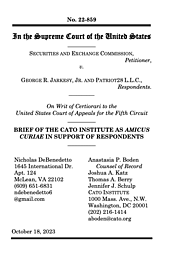Learn more about Cato’s Amicus Briefs Program.
Chief among the causes of the American Revolution was the British’s repeated denial of the right to a civil jury trial. Americans were keenly aware that juries provided a bulwark against governmental abuse when the Crown tried to seize the colonists’ ships or to otherwise take away their property and freedom. It was exactly because juries were so effective at curbing injustice that the British continuously tried to evade jury trials by setting up special admiralty courts or creating special jurisdictional rules. The absence of a civil jury trial right was nearly fatal to the Constitution’s ratification, leading the Founders to later adopt such a right in the Seventh Amendment.
The growth of the administrative state imperils that precious right. The Securities and Exchange Commission (SEC), for instance, has become increasingly reliant on in-house adjudications, which replace juries with in-house administrative law judges (ALJs) who work for the same team as the prosecutors. The Commissioners are the ultimate adjudicators of SEC cases, since they hear appeals of the judges’ decisions. But that’s cold comfort to the defendants, since the Commissioners have a close working relationship to the prosecutors, are allowed to pre-judge the evidence at an early stage, and give the green light about whether to proceed with investigations in the first place. Not surprisingly, SEC is able to amass a higher win rate when it litigates in house, and Commissioners rarely overturn ALJ decisions. The Center for Constitutional Studies recently filed a brief asking the Supreme Court to deem these in-house proceedings a denial of the Seventh Amendment.
Administrative agencies justify in-house adjudications on the basis of “expediency,” but the event underlying the case now before the Court began years ago. Prior to 2010, the Securities and Exchange Commission could use its in‐house courts to pursue punitive sanctions against only registered market participants. With the passage of the 2010 Dodd‐Frank Act, however, Congress authorized the SEC to seek penalties against “any person” through its home‐court proceedings, where the agency acts as both prosecutor and judge. George Jarkesy was among the first targets of this enhanced authority.
Jarkesy had managed several investment funds geared toward sophisticated parties who wanted high‐risk, high‐reward investments. After the funds suffered losses during the 2008 market collapse, the SEC launched an investigation into Jarkesy’s management of the funds. In 2013, the SEC alleged that he had violated federal securities law and elected to prosecute its case through the agency’s in‐house court system.
Before the 2010 Dodd‐Frank Act, Jarkesy would’ve gotten his day in court before a jury of his peers. Instead, he was subjected to a Kafkaesque administrative adjudication that lasted more than seven years. Predictably, the SEC ruled against Jarkesy and imposed a lifetime ban on employment in the securities industry in addition to a $350,000 fine.
Jarkesy challenged the SEC’s ruling in the Fifth Circuit. He argued that the SEC’s in‐house proceedings violated his due process guarantees and his Seventh Amendment right to a trial by jury. He won, but the Supreme Court has decided to take up SEC’s appeal. Cato’s brief highlights the importance of the right to civil jury trial to the Founders, which was based on colonists’ direct experiences in the courts. Cato argues that SEC’s home court advantage violates the Seventh Amendment and yields predictably biased and unfair results.
View this case’s court docket, including the full opinion, here.

This work is licensed under a Creative Commons Attribution-NonCommercial-ShareAlike 4.0 International License.



